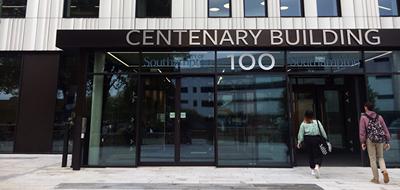How the University is funded
The university has a variety of income sources to support its work, including student fees, government grants, donations, borrowing, and self-generated income through commercial activities. This income is used to support a wide range of different activity including teaching & learning, cutting-edge research, knowledge exchange and community engagement. Ensuring research led teaching and learning excellence, a quality student experience and student outcome success are at the centre of everything we do at the university.
The slides below provides an overview of the University’s income and expenditure in 2020/21, and how that relates to your fees.
Spending money to improve your experience in 2020/21
Some of the significant projects impacting on your student experience that formed part of expenditure in the 2020/21 financial year include:

- Improving the quality of our teaching facilities and increasing the number of available lecture theatres, through
- The opening of the new Centenary building
- The refurbishment of the Chemistry building
- Completing the final phase of the Boldrewood Innovation campus redevelopment
- Improving the quality of our student accommodation, with the upgrade and refurbishment of the common rooms and learning spaces at Glen Eyre and Highfield Hall, and commencement of the expansion of the Boiler House common space at Wessex Lane
- Making it easier for new and existing students to find the information they need, through the OneWeb project to review and improve our web presence
Your questions
The questions below have been identified through a SUSU consultation with students.

Investment in academic staff
Academic staff costs represented 28% of total University expenditure in 2020/21; in addition, they are supported by a range of other services such as administrative staff (to support the non-academic work required to support the academic experience), the Library (access to academic resources), Human Resources (access to development opportunities, and wellness support), Estates (ensuring that building and other infrastructure is available) and Finance (to ensure the University has the financial resources to operate), who all work together to ensure the smooth running of the University.
Funding for library services
The University spent £7.6m on Library Services in 2020/21, £5.3 million of which was used to provide access to digital and print information resources including 1,500,000 printed books, 200,000 ebooks and 47,000 journal titles. We invest in expert staff in order to provide the best possible support to our students, and more than 2840 of our students took part in face to face academic skills training in last year. In 2020/21 we invested an additional £500,000 in the improvement of our physical spaces and over £600,000 to introduce new technology and services to support our students including a new faster self-loan book system and the introduction of self-service laptop loan lockers.
Funding for Enabling Services
Enabling services are funded to provide a range of services, including
- Support for students with a range of disabilities, the largest groups of which are students with cognitive (learning) disabilities and mental health disabilities
- Support for victims and students in crisis
- Specialist support services such as Counselling and Hypnotherapy
This funding is included in the teaching spend category ‘Student support’, and the budget for this area of work (including Student Life) was £3.6M in 2020/21. Enabling Services is available for all students at the University and is accessed by a large number of students through different points of their student journey. At the start of the current academic year 12% of our students have a disclosed disability or mental health condition.
Funding to support students with disabilities
A previous question addresses the funding for enabling services in general, which includes funding for students with disabilities. While the University does receive Disabled Student Allowances (DSA) for some students, this only represented 17% of the budget/expenditure for this area of work in 2020/21. Students who do not receive DSA allowance are also eligible for support by the University, and we do not differentiate between the services made available to student who do and do not have access to DSA funding.
Funding for the Careers service
This funding is included in the fee spend category ‘Student support’, and the budget for this area of work was £2.2M in 2020/21. This funding supports the delivery of the central University careers offering and does not include expenditure within specific Faculties. This service provides access to information advice and guidance, professional development opportunities, employer events and enterprise activities for all students of the University and recent graduates.